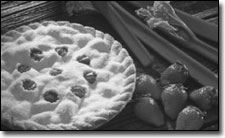|
by Chef Boy Ari
 Months before he died, the great poet Pablo Neruda
finished his last work, The Book of Questions. Every
sentence of every stanza of every poem is a question,
and they combine the infinite springtime innocence of
a child asking "Why is the sky blue?" with the weathered,
grim, autumnal musings of a wise soul, who still can't
quite comprehend it all. Months before he died, the great poet Pablo Neruda
finished his last work, The Book of Questions. Every
sentence of every stanza of every poem is a question,
and they combine the infinite springtime innocence of
a child asking "Why is the sky blue?" with the weathered,
grim, autumnal musings of a wise soul, who still can't
quite comprehend it all.
Neruda also asks, "If all rivers are sweet, where does
the sea get its salt?"
I was reminded of that question one soggy day at the
Farmers Market, looking into the eyes of a bereaved friend
while she held a bunch of radishes. She was somber and
quiet, but her eyes were so clear they startled me.
Later, by the creek that runs through the ashes of a
burned forest where I was hunting soggy morels in the
rain, I thought of those eyes. Like her eyes, that creek
was clear, blue and sweet, and this was a surprise. I
expected the creek to be dark with ash.
In life, as in food, there is sweetness and saltiness,
sourness and bitterness. More often than not, these opposing
forces are present together in some combination, highlighting
each other. At least one would hope so. For what good
would be rhubarb without the counterbalance of sweetness?
Ah, rhubarb, that impossibly sour blessing of spring.
In and of itself, it's too sour to be eaten unsweetened.
But what really brings rhubarb to life is combining it
with fruit.
This brings us to the sweet-and-sour riddle of the day:
What kind of god, or goddess, or whatever decides these
things, decided to put such a sharp barb in the rhubarb,
by making it an early-season thing, and strawberries
a mid-summer's thing, with apples ripening in the fall?
If I were Pablo Neruda, I'd ask, "Does the rhubarb dream
of strawberries, and wake up crying?"
Ashes, rain, rhubarb. This whirlwind of thoughts haunted
me as I contemplated the fire at morel camp. Then my
friend Margie sat down by the fire and began to make
a cobbler out of fresh rhubarb and store-bought strawberries.
The strawberries were flown in from a farm far away,
and they were nothing like the strawberries from my garden
that will be falling apart juicy in the coming weeks,
just as the rhubarb will be growing stringy as it goes
to seed.
Margie melted butter in the skillet. Next, she added
the chopped opposing forces of strawberries and rhubarb
and sprinkled them with sugar. Then she spread a layer
of granola on top. After that another layer of strawberries
and rhubarb, sprinkled with more sugar, and another layer
of granola. She put a lid on the skillet and cooked it
on the fire. Store-bought strawberries notwithstanding,
it was magnificent. You can do the same thing with apples
instead of strawberries, or apricots, or raspberries85
. Meanwhile, I realized something about all of this angst
I've been sensing.
See, if you want to make a rhubarb cobbler like this,
but with ingredients from your own garden, there is a
way: Acquire rhubarb now and freeze it. When the strawberries
are ripe, thaw the rhubarb and do what Margie did. Or,
make strawberry-rhubarb pie. When the apples are ripe,
thaw more rhubarb and make apple rhubarb crisp.
Combining the opposing forces of life into one cohesive
package is the best we can do, like sitting in front
of a hot fire with the cold wind at your back, or drinking
a cold one in the parching sun. But since you can't always
find it all at the same time, you need to take what's
available today and squirrel it away-both physically
and metaphysically. When you're cold and wet, it helps
to think about how hot it will be soon, and make a point
to remember that rain during the heat of summer. And
when the sun comes out, don't spend it all in one place.
Make hay, and save it for the cold and dark, when you'll
need it.
If that's too esoteric for you, here's a real world
counterpart. When the August peppers are bursting with
summertime heat, pickle them in jars to keep you warm
all winter. And when your bucket is full of morels plucked
from the wet ashes, dry them, or sautE9 them in butter
and freeze them. Save them however you can and use them
in autumn, because few things are better with morels
than wild game.
The morel of the story? Get it while you can. Save some
for later, when you might need it the most, so you can
eat apple/rhubarb cobbler by the fire as the autumn leaves
are falling. And if you want to pickle some of that summertime
heat, now is the time to prepare. Go get some young pepper
starts at the garden store or the greenhouse, and put
them in the ground now.
That's the rhubarb epiphany.
|